A bizarre New York Times column exaggerates the dangers of exaggerating the dangers of Ron DeSantis
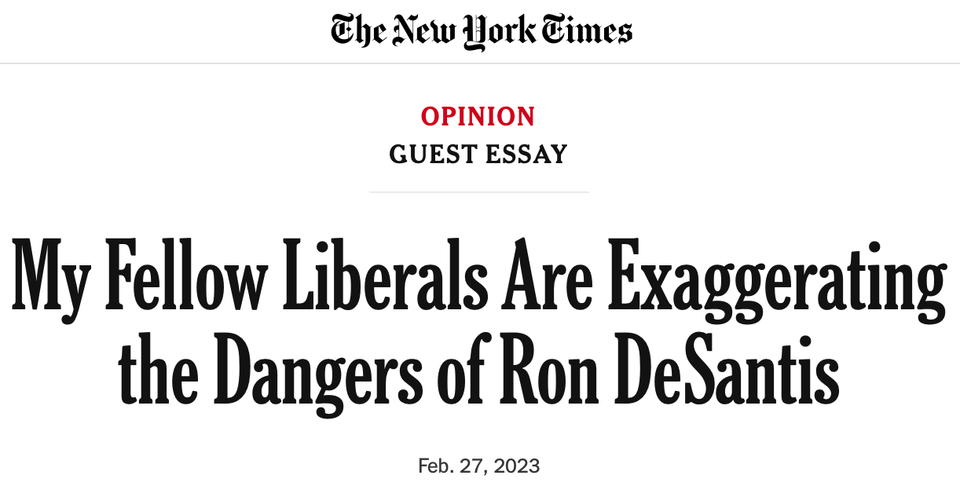
Let’s talk about why this exists:
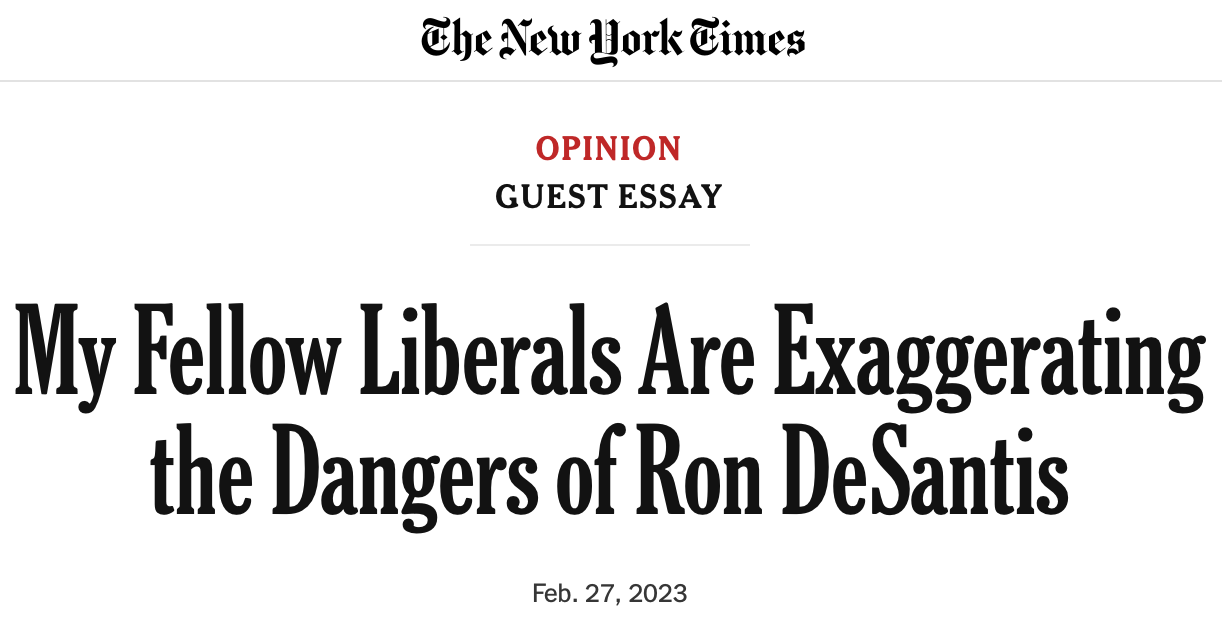

Ostensibly, this exists because “liberal criticizes liberals” is the kind of counterintuitive statement against self-interest that newspaper opinion sections love to run. And the kind that the New York Times particularly loves to run if it’s a liberal criticizing liberals.
But is Damon Linker a liberal? Does he actually have standing to lecture liberals from inside the tent?
Here’s Linker on Twitter just ten days ago announcing his plan to “reappropriate the term ‘liberal’ for myself”:

Oh.
And here’s Damon Linker six months ago calling himself a “conservative liberal”:
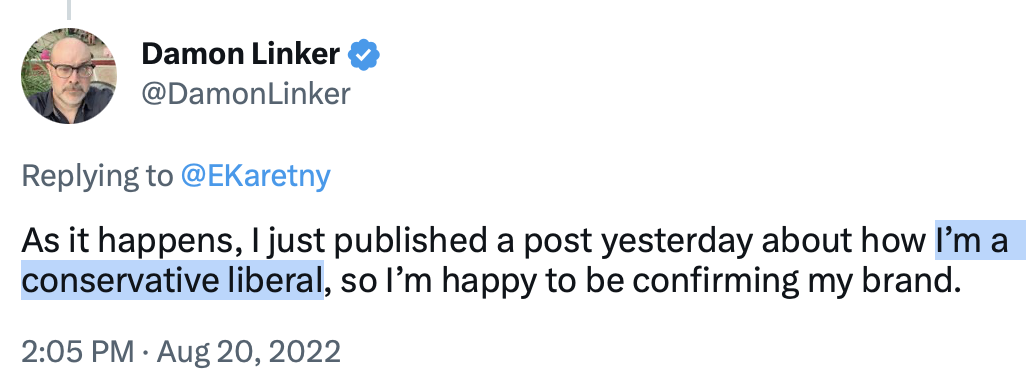
Oh.
And here’s Damon Linker a couple years back saying he “could imagine” thinking of himself as a “conservative”:
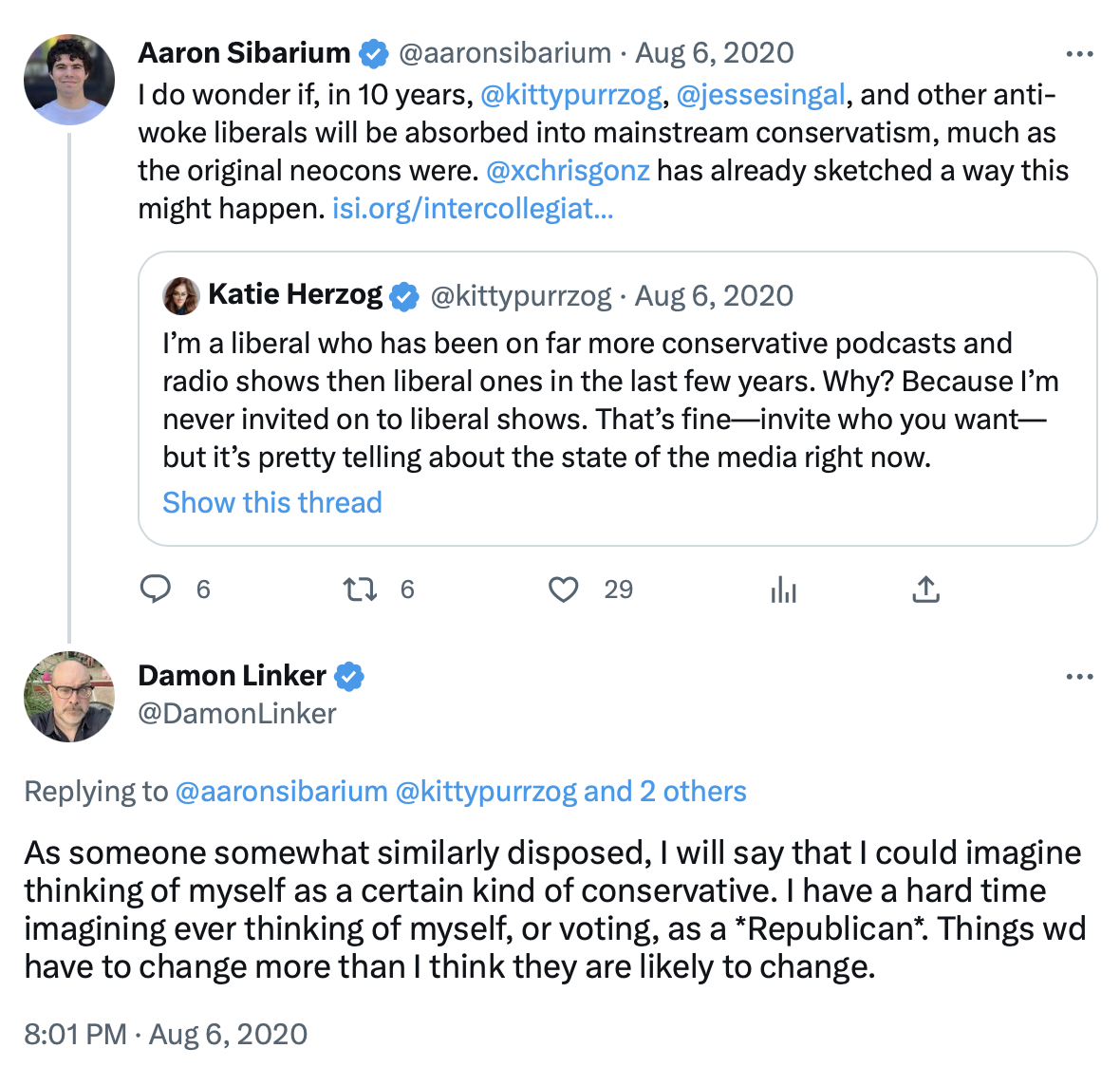
Here’s Linker on his Substack last August:
I’m well aware that I reside on the conservative edge of the Democratic Party. And that’s fine, even if my preferences often lose out in intraparty debates. Where else am I going to go? As someone who blends liberal and conservative impulses in a pretty idiosyncratic way, I’m exceedingly unlikely to find a perfect home in a country with just two viable parties. The liberal tradition that remains a vital part of the Democratic Party, and which at its best I deeply admire, is as good as it’s likely to get for me. [emphasis added]
Linker may be a bright and thoughtful person for all I know. I don’t read him with any regularity. And there’s certainly nothing inherently wrong with “blending liberal and conservative impulses in a pretty idiosyncratic way.” Not everyone needs to (or should) fit into a neat ideological bucket.
But it should be pretty obvious that Linker is not someone who can use the phrase “My Fellow Liberals” with much credibility, or someone who should be given precious real estate in the New York Times on the premise that he is speaking uncomfortable truths to his ideological cohort. That the essay is a small fraud committed by the Times against its readers. Joe Manchin describes himself as “a centrist, moderate conservative Democrat” but it’s pretty clear that the New York Times wouldn’t run an essay by Joe Manchin titled “My Fellow Conservatives Are Exaggerating The Threat Of Joe Biden.” We all know this, right?
OK, great. Moving on.
Let’s look past the “My Fellow” for a second, and consider the rest of the headline: “Exaggerating the Dangers of Ron DeSantis.”
Again: Why does this exist?
Even if we stipulate for a moment that the dangers of Ron DeSantis are being exaggerated, there’s probably something approaching universal consensus that “political actors exaggerating the danger of their opponents” is a common occurrence. The kind of dog-bites-man thing that doesn’t really merit space in the world’s most influential opinion pages. So even if Linker is right … so what?
Against my better judgment, I read Linker’s piece.1 In it, Linker argues that “if Mr. DeSantis does get the nomination, progressive overreaction toward him in the primary contest could ultimately undermine the case against him in the general election.” I guess that is maybe, theoretically a topic worthy of some intra-left strategic debate, but it still seems like pretty thin premise for a column in the New York Times. And then there’s this: Is it even particularly likely? Would an exaggerated critique of DeSantis make him harder to beat? That isn’t self-evidently true; if it was, politicians probably wouldn't so frequently exaggerate the dangers their opponents pose. Linker himself writes:
Liberals have a long history of hyping fears of Republican presidential candidates, from Lyndon Johnson’s “daisy” ad (about Barry Goldwater and a potential threat of nuclear war) to sometimes hysterical warnings about various dire threats posed by John McCain in 2008 and Mitt Romney in 2012.
If you’re keeping score, Democrats went 3-0 in those elections — and none of them was close.2 How does this support the assertion that “overreaction” to DeSantis “could ultimately undermine the case against him in the general election”? Linker doesn't say, and his editors at the New York Times apparently didn't think to ask. Hey, it’s just the core premise of the column.
OK, so … are liberals exaggerating the threat DeSantis poses? Linker’s argument is that Ron DeSantis would be a very bad president:
The case against Mr. DeSantis is rooted in his policy commitments. During his time as Florida’s chief executive, he has governed from the hard right, taking aggressive aim at voting rights, pursuing politicized prosecutions, restricting what can be taught in public schools and universities, strong-arming private businesses, using refugees as human props to score political points and engaging in flagrant demagogy about vaccines. Before that, as a congressman, he supported cuts to Social Security and Medicare and voted for a bill that would have severely weakened Obamacare. […]
Mr. DeSantis is a bully who’s ready and willing to trample freedom of speech and expression, voting rights and common decency to win the applause of the Republican base so he can win office and advance the G.O.P. dream of gutting the social safety net in return for tax cuts that benefit wealthy right-wing donors.
Elsewhere, Linker has compared DeSantis to Hungry’s Viktor Orban, who the EU says has created an “autocracy.”3 If Linker thinks DeSantis would be so terrible, what's the problem? Well, some liberals have suggested DeSantis might be as bad as Trump, or even worse. And that’s it. That's Linker’s entire complaint: “Mr. DeSantis almost certainly would not be worse than Mr. Trump.”
Wait: Almost certainly? Yeah. Almost certainly. Linker acknowledges the targets of his ire have a point when they argue that Trump’s “ineptness” limited the damage he was able to do — and that DeSantis “would likely display greater discipline and competence”:
Could the Trump era have been worse? Absolutely, and here liberals have a point when they suggest Mr. Trump’s ability to wreak havoc was limited by his ineptness. Based on what we’ve seen of Mr. DeSantis’s performance as governor of Florida, a DeSantis administration would likely display much greater discipline and competence than what the country endured under Mr. Trump.
And, sure enough, when Linker was banging this drum last summer — he’s been on the “stop saying DeSantis would be so bad” kick for a long time — he acknowledged there’s really know way to be sure whether Trump or DeSantis would be worse.
So, to sum up: The New York Times ran a guest column framed as a “liberal” speaking truth to his in-group written by someone who calls himself a “conservative liberal” and who just ten days ago announced a plan to “reappropriate” the term “liberal,” in which he complains that liberals are committing the quotidian political sin of exaggerating the dangers posed by an adversary (even as he acknowledges that the adversary in question is indeed quite dangerous) because the adversary is probably not as dangerous as another adversary.
Oh, and this guy kinda wanted Trump to win in 2016. ¯\_(ツ)_/¯
So anyway, the real reason this is Damon Linker New York Times column exists is one or more of the following:
- The New York Times opinion editors have lost all perspective about what is interesting or important or even noteworthy.
- Linker is buddies with someone at the Times.
- The New York Times kind of likes Ron DeSantis and is giving him the George W. Bush treatment.
None of those are good reasons. But here we are.

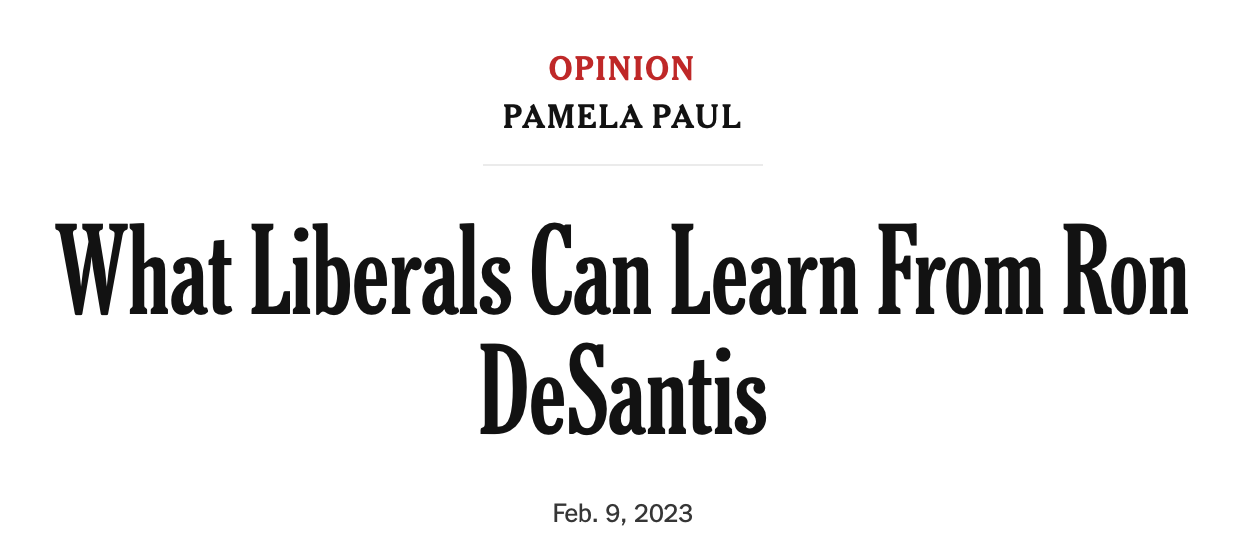
“You have to read past the headline” is one of the most-wrong thing journalists frequently say to critics. The headline is how you advertise (and ideally summarize) the piece. If it sucks, I’m under no obligation to read further and am likely to instead seek out something with a headline that suggests it might be worth my time. Plus we all know that won’t read past the headline, so if the headline sucks in a way that misleads readers, you don’t get yourself off the hook by saying “well if you read 27 paragraphs down you’d find the truth”: You’ve misinformed them. ↩
I do not agree that these are particularly compelling examples of extraordinary or inappropriate “hyping fears” about an opponent. All pale in comparison with fear-hyping done by conservatives in opposition to, say, Bill Clinton or Barack Obama or Hillary Clinton or Mike Dukakis or Al Gore. Linker’s apparent perspective that Mitt Romney was a more notable target of unfair criticism than Hillary Clinton, and that exaggerating the danger of opponents is something liberals do more than conservatives, is yet another reason to doubt his liberal bona fides. It’s standard-issue right-wing persecution complex. ↩
Linker left that comparison out of his Times piece, perhaps because whining that liberals are exaggerating the dangers of an Orban-like figure doesn’t pass the laugh test. ↩
Member discussion